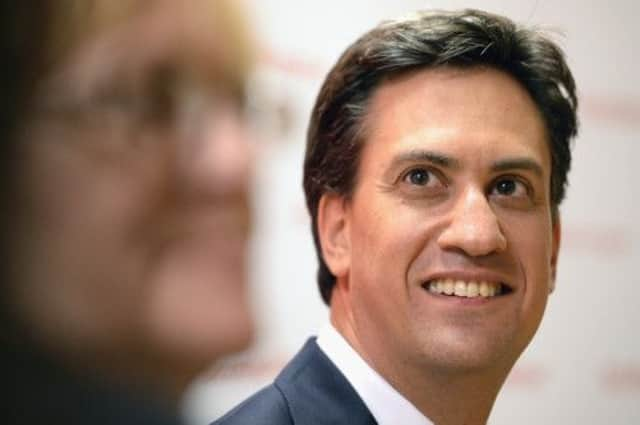Labour hits back at Cameron over Co-op Bank ‘smears’


The Labour leader claimed David Cameron was trying to score “cheap political points” instead of sorting out the chaos surrounding Mr Flowers’s role at the bank.
As yet more damaging allegations surrounding the Methodist minister’s conduct came to light, Mr Miliband accused the Conservatives of “throwing around wild accusations” about the disclosure that Labour has benefited from £18 million worth of loans or credit facilities from the Co-op over the last 14 years.
Advertisement
Hide AdAdvertisement
Hide AdThe scandal that has seen Mr Flowers investigated by police for allegedly buying crystal meth and cocaine has led to the Conservatives asking questions about Labour’s relationship with the bank he chaired until 2013.
Earlier this week, Mr Cameron announced an inquiry into the bank’s ailing finances and the decision to appoint Mr Flowers.
The Conservative MP Brooks Newmark has claimed that the controversy unfolding around Mr Flowers, a former Labour councillor, had “peeled back an unhealthy and poisonous relationship between Labour and the Co-op Bank”.
Mr Miliband retaliated yesterday by accusing the Prime Minister of taking a “serious situation at the bank” and using it to make a “cheap political point”.
The Labour leader said: “I think what this episode says is more about the character of the Prime Minister than the character of Labour’s relationship with the Co-op. We have a Prime Minister who, when he sees a serious situation at the bank, turns to make cheap political points rather than sorting out that serious situation.
“And frankly, if David Cameron is determined to smear his way through the next 18 months that’s wrong and that is not what the British people expect from their Prime Minister.”
Mr Miliband said: “As soon as I knew about Reverend Flowers’ activities he was suspended from the Labour Party and now … there does need to be a look at the regulatory issues around the regulation of the Co-op and Rev Flowers’ role in that.”
He said the Labour Party had a “historic relationship” with the Co-op that long pre-dated Mr Flowers’ involvement with the bank.
Advertisement
Hide AdAdvertisement
Hide AdMr Miliband had to fend off claims that Labour benefited from a relationship with the Co-op Bank that saw the party receive £18m worth of so-called “soft loans”, lending arrangements made at interest rates that were lower than those given to other Co-op customers.
Documents lodged with the Electoral Commission show that the £18m included £4m over seven years, in 1999, at an interest rate of 6.8 per cent; £2m in 2007 for five months at two per cent above base rate; a £2m emergency overdraft in 2009, at five per cent above base rate; and £1.2m over six months in 2006, at two per cent above base rate.
The only outstanding loan was one worth £1.2m handed out in March this year, just a few weeks after Mr Miliband invited Mr Flowers to his Commons office for private talks.
That loan was given at 3.5 per cent above the current base rate of 0.5 per cent.
Both Labour and the Co-op Bank disputed the borrowing arrangements were “soft loans”. A Labour spokesman said: “Our loan with the Co-operative Bank is secured and is being repaid in accordance with a formal long-term commercial agreement and the Labour Party is on a secure footing for the future.”
A Co-op spokesman said: “It is not a soft loan. In fact it is a higher average loan rate than we would make to other corporate customers.”
Questions were also raised by a donation made to shadow chancellor Ed Balls of £50,000 by the Co-operative Group.
Mr Balls told the BBC he had “nothing to hide” and Mr Flowers was not involved.
Advertisement
Hide AdAdvertisement
Hide AdMeanwhile, Mr Flowers’ troubles showed no sign of abating yesterday when it emerged he left a drug charity after an inquiry over claims for expenses, including for travel and dining.
He quit the Lifeline Project, where he was a trustee on the board of the organisation, the charity said. He left the charity in 2004, long before he was engulfed in allegations of illegal drug use and sex with a rent boy that led to his suspension from the Methodist Church.
Ian Wardle, Lifeline’s chief executive, told BBC Radio 4’s World at One there was concern at the nature of some of the claims made by Mr Flowers during his time with the charity.
He said: “The sum in question initially was between £60,000 and £70,000 spread over a five-year period. There was a concern about that sum of money, it’s a significant sum of money. There was greater concern, it’s fair to say, about the nature of some of the claims.
“There were a variety of claims and some of them were clearly legitimate, but there was quite a lot of travel, quite a lot of dining, quite a lot of hotels.
“So the variety of the claims and the size of the claim concerned us and we felt it legitimate to present this information to our trustee body – that’s the ruling body of our charity – because we felt a more detailed investigation was necessary.
“That detailed investigation took place, part of it was to actually get clear from Rev Flowers what the purpose of a lot of these claims had been. But we didn’t really get satisfactory answers to those questions.”
He added: “We didn’t conclude the investigation in the manner in which we wished because the Rev Flowers resigned as chair of Lifeline during the course of this.”
Advertisement
Hide AdAdvertisement
Hide AdA Charity Commission spokeswoman said: “We can now confirm that the charity Lifeline Projects contacted the Commission in 2004 to inform us of concerns into expenses payments made to a former trustee. We are working to establish the details of the charity’s report to us and our regulatory response.”